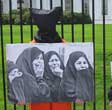The rule of law even when it is inconvenient

Following the arrest of Umar Farouk Abdulmutallab, the 23-year-old Nigerian captured with an explosive device on a Northwest flight, Joseph Kaifala stresses that each and every individual accused of criminal activity must be treated according to the rule of law.
Many in Africa might be wondering why Umar Farouk Abdulmutallab, the 23-year-old Nigerian who was captured with an explosive device in his underpants onboard the Northwest flight 253 from Amsterdam to Detroit, was not immediately tortured or killed by US security forces. This sort of speculation is in place, especially in Abdulmutallab’s own country where such unlawful torture or executions are not unusual. Take for instance the case of Muhammed Yusuf, the head of the Nigerian Islamic sect Boko Haram, who was captured alive and healthy, but later found suspiciously shot dead in police custody.
Yusuf, like Abdulmutallab onboard the Northwest flight, was no doubt a terrorist caught in the act. His extremist sect, Boko Haram, had publicly declared its intention of overthrowing the Nigerian government, banning all Western education and instituting sharia law. In July 2009, crowds of Boko Haram militants tried to storm government buildings and police headquarters in Bauchi state. The ensuing violence led to the death of an estimated 600 people. General public sentiment in Nigeria wanted Yusuf dead, just as much as ordinary Americans would not have quivered to see Abdulmutallab dead on scene.
However, one of the duties of any democratic government is to enforce the rule of law, and extrajudicial killing is a violation of our constitutional obligations and human rights. In his own country, Abdulmutallab’s head would have long been delivered on a platter, and even in America some are calling for such tit-for-tat justice, and if not at least that torture be perpetrated to obtain more information about the engineers of Abdulmutallab’s attempted bombing. President Obama’s administration has shown that adherence to the rule of law, especially the due process clause of the US constitution, must not be twisted as a matter of convenience as we saw in the previous US administration. Even those who blatantly hate us must be given their due before a dignified system of law and good governance.
Let it be known to all African governments that the law is there to protect both victims and perpetrators of violence. While it will be quite convenient to immediately execute those who attempt to murder us, it is definitely not in our interest to abandon fundamental principles and ideals at every minor test. Governments must avoid reverting to Moses’s law by ignoring our hard-achieved rule of law and the Geneva Convention. Those who hurt or attempt to hurt us must be legally punished through the proper provisions of law, even if such processes appear long and cumbersome.
Umar Farouk Abdulmutallab might not have died that day, but he would surely be reprimanded within the full measure of law as guaranteed by the American constitution. At the end of the day, justice would have been done and the American rule of law would have remained intact on the pedal stool upon which it belongs. The point I am making is that democracies should avoid stooping to the level of their enemies. We constantly witness extrajudicial justice in most African countries, which is why ordinary citizens find it difficult to obey laws that could easily be violated by their leaders willy-nilly. The laws must be there as instruments of equal protection for all against the tyranny of governments and the selfish interests of individuals. The Nigerian government should learn that it could have equally punished Yusuf within the provision of law and avoided the embarrassment of extrajudicial murder now circulating on YouTube.
BROUGHT TO YOU BY PAMBAZUKA NEWS
* Please send comments to [email protected] or comment online at Pambazuka News.

